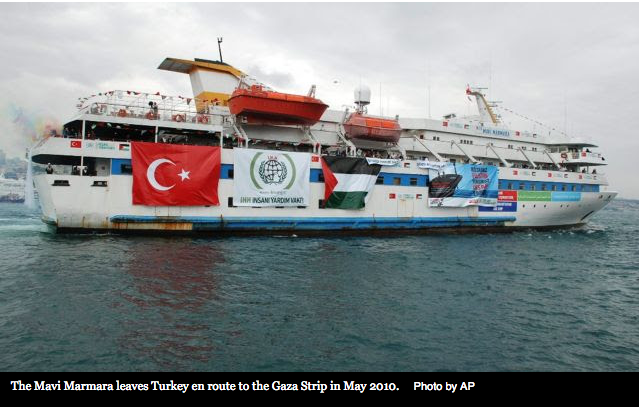 What this Haaretz article does not cover is one of the reasons this case was reopened. Many of you who had been on the DIGNITY and SPIRIT OF HUMANITY voyages in December 2008, January 2009 and July 2009 filled out the ICC forms stating that what Israel did was not a one-off attack on Freedom Flotilla I. Free Gaza board members, Audrey Bomse and Greta Berlin, along with the lawyers from the UK, put all of these testimonies together and sent them to the law offices in the UK who then filed them with the ICC.
What this Haaretz article does not cover is one of the reasons this case was reopened. Many of you who had been on the DIGNITY and SPIRIT OF HUMANITY voyages in December 2008, January 2009 and July 2009 filled out the ICC forms stating that what Israel did was not a one-off attack on Freedom Flotilla I. Free Gaza board members, Audrey Bomse and Greta Berlin, along with the lawyers from the UK, put all of these testimonies together and sent them to the law offices in the UK who then filed them with the ICC.
So, thanks to all of our passengers on those three trips who took the time to fill out these LONG legal forms (which had to be in a certain format with ONLY the facts without any subjective comments). All in all, we ended up with over a dozen of these forms from passengers on the other three voyages… setting out a chain of violence rather than just the one time incident.
http://www.haaretz.com/news/diplomacy-defense/.premium-1.666658
For those of you who do not have an account with Haaretz, here is the text.
A pretrial chamber of the International Criminal Court ruled Thursdaythat the court’s prosecutor, Fatou Bensouda, should reconsider her decision not to investigate the 2010 Mavi Marmara incident in which Israeli commandos killed Turkish citizens on a ship trying to breach the Gaza blockade.
The ruling sends a warning to anyone who has never taken the court seriously. The ICC dismissed Bensouda’s decision in a way that will leave her no choice but to launch a probe. The original complaint was made to the court by the Comoros Islands, in whose name the ship was registered.
In her 2014 decision, Bensouda claimed that even though there was some basis for considering that war crimes had been committed, especially regarding the killing of 10 passengers, the isolated, small-scale incident did not warrant a full-blown investigation. According to the Rome Statute that governs the court, gravity is a requirement that Bensouda determined was not fulfilled in this case.
In their 2:1 ruling, the judges dismissed the prosecutor’s conclusion. The court noted the 10 killed and 50 wounded, with possibly hundreds of assaults on human dignity, acts of torture or inhumane treatment.
In terms of scope, the question of gravity should not rule out an investigation. In terms of the alleged crimes, the judges said the question of gravity should also not rule out an investigation because there was plenty of evidence on the inappropriate treatment of passengers such as prolonged handcuffing, violence and blocking access to medication.
The judges believe that at such an early phase the prosecutor should not have ruled out that these acts and the killings constituted war crimes, but should have demanded an investigation. The judges also referred to claims that Israeli soldiers opened fire even before boarding the ship, and that some people were shot after surrendering. These claims justified an investigation, the judges said, because they implied intent to kill passengers.
According to the judges, even if the events were unclear and included conflicting testimony, only an investigation could determine what happened. The prosecutor’s decision to close the file after a preliminary examination was unreasonable, they said.
Basically, the judges are telling the prosecutor that she did not give sufficient weight to evidence of possible crimes on the Marmara. The judges note that she not only gave insufficient weight to the harm done to passengers, she ignored the wider message to Gaza residents regarding the blockade and Israel’s restrictions on humanitarian aid.
The judges conclude that it’s hard to bridge the discrepancy between the prosecutor’s decision based on a lack of gravity and the wide concern the flotilla event created, which led to several commissions of inquiry. This gap, they stressed, is incompatible with the fact that the court’s mission is to investigate crimes of concern to the international community.
The court’s decision is essentially procedural. It tells the prosecutor she closed the file prematurely and should reconsider her decision not to investigate. It appears she will now have to launch an investigation — though this doesn’t mean anyone will be prosecuted.
Still, the judges’ ruling has wider implications for preliminary examinations by the prosecutor on Israeli-Palestinian issues. The decision will make it difficult for her not to investigate alleged war crimes by both sides in last summer’s Gaza war, especially in light of the recent report by a UN commission of inquiry. Also, the decision might accelerate her launching of an investigation into construction in the settlements as well.
The judges sent a clear message: The fact that the Israeli-Palestinian conflict is a hot potato does not deter the court, whose intervention is justified by the intense international interest in the issue. These moves show that Israel’s political-legal tangling with the court is only beginning.
